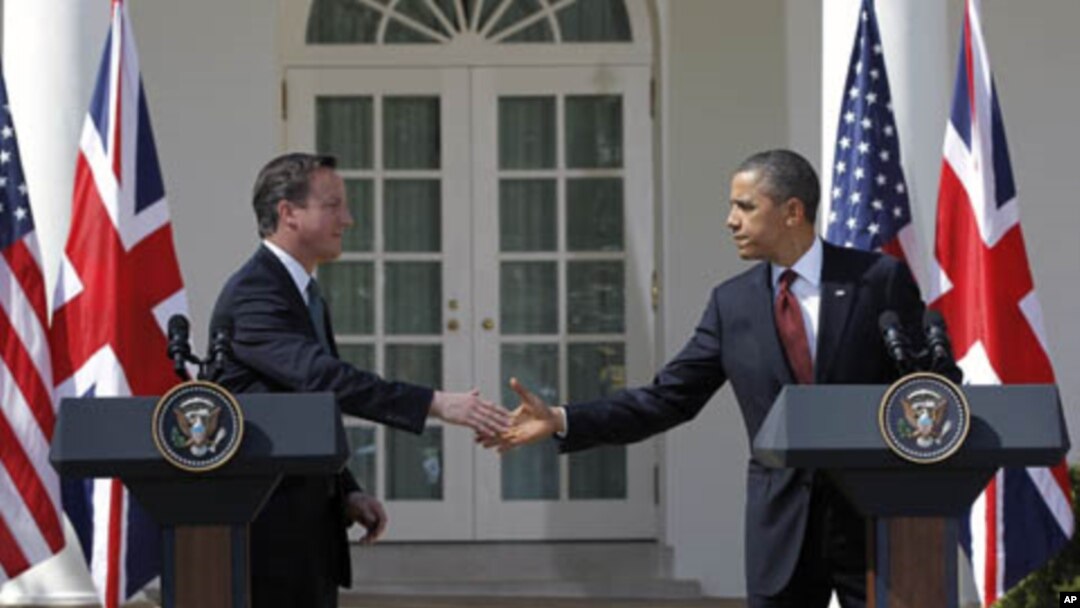In talks at the White House on Wednesday, U.S. President Barack Obama and British Prime Minister David Cameron reaffirmed plans to shift military operations to a support role in Afghanistan next year, ahead of a planned withdrawal of foreign forces in 2014. The two leaders also discussed Syria, and mounting pressure on Iran over its nuclear program.
After about two hours of talks, including a 30-minute, private session in the Oval Office, both men faced reporters in the White House Rose Garden.
In reference to the killing of 16 Afghan civilians allegedly by a U.S. soldier, Mr. Obama said "tragic events" in Afghanistan in recent days are a reminder of the difficulty of the allied mission there. But, he said, it is undeniable that "very real progress" is being made.
Watch a related report by VOA's Kent Klein
The two leaders reaffirmed the plan to transition security to Afghan authorities by 2014. President Obama said the NATO summit he will host in Chicago in May will determine the next phase of the operation.
"We are going to complete this mission and we are going to do it responsibly," said President Obama. "And NATO will maintain an enduring commitment, so that Afghanistan never again becomes a haven for al-Qaida to attack our countries."
Mr. Obama and Mr. Cameron reiterated support for a negotiated Afghan political settlement. Mr. Cameron said the aim is not to build a "perfect Afghanistan," but to foster a country that is able to stand on its own.
"We can help ensure that Afghanistan is capable of delivering its own security without the need for large numbers of foreign troops," said Prime Minister Cameron.
Mr. Obama said public opinion surveys point to increasing American opposition to military operations in Afghanistan and that people are "weary" of war. But, the president said he thinks "the vast majority" of Americans and Britons "understand why we went there."
Both leaders called the situation in Syria complicated. They endorsed ongoing political and diplomatic efforts to end the turmoil there, including pressing Russia and China to agree to a United Nations Security Council resolution condemning the violence, along with efforts to get humanitarian aid to those in need.
Prime Minister Cameron said, "The fastest way to end the killing, which is what we all want to see, is for [Syrian President Bashar al-] Assad to go," he said. "So the way we should try to help bring that about is through diplomatic pressures, sanctions pressure, political pressure, the pressure that [former U.N. Secretary-General] Kofi Annan can bring to bear - that is where our focus is."
Mr. Obama said China and Russia need to "stand up on behalf of people who are being shelled mercilessly" by President Bashar al-Assad's forces and join the international coalition working for a solution.
President Obama and Prime Minister Cameron reiterated their determination to prevent Iran from obtaining nuclear weapons. Mr. Obama said Iran should seize the opportunity of upcoming talks with the P5+1 group of nations to reach a diplomatic solution.
"They should understand that because the international community has applied so many sanctions, because we have employed so many of the options that are available to us to persuade Iran to take a different course, that the window to solving [this] diplomatically is shrinking," Obama said.
Mr. Obama repeated that the United States is determined not simply to contain a nuclear Iran, but to prevent Tehran from obtaining atomic weapons.
President Obama and Prime Minister Cameron emphasized the strength of the Anglo-American alliance, with Mr. Obama calling it "rock solid."
.S. President Barack Obama says the United States is making "very real progress" in Afghanistan, despite new tensions following the shooting deaths of 16 Afghan civilians allegedly by a U.S. soldier.
Obama spoke at a joint White House news conference with British Prime Minister David Cameron Wednesday.
The president said the "tragic events" of recent days in Afghanistan are a reminder that the mission remains difficult, but that U.S. and NATO forces have made key gains.
"What's undeniable though, and what we can never forget, is that our forces are making very real progress dismantling al-Qaida, breaking the Taliban's momentum and training Afghan forces so that they can take the lead and our troops can come home," Obama said.
Obama also said the timeframe for withdrawing U.S. troops remains. That plan would see U.S. and NATO turn over full responsibility for security to Afghan forces in 2014.
Prime Minister Cameron said he also remains optimistic, and that Afghanistan is less of a threat now than before.
"If you compare where we are today with where we've been two, three years ago, the situation is considerably improved," said Cameron.


